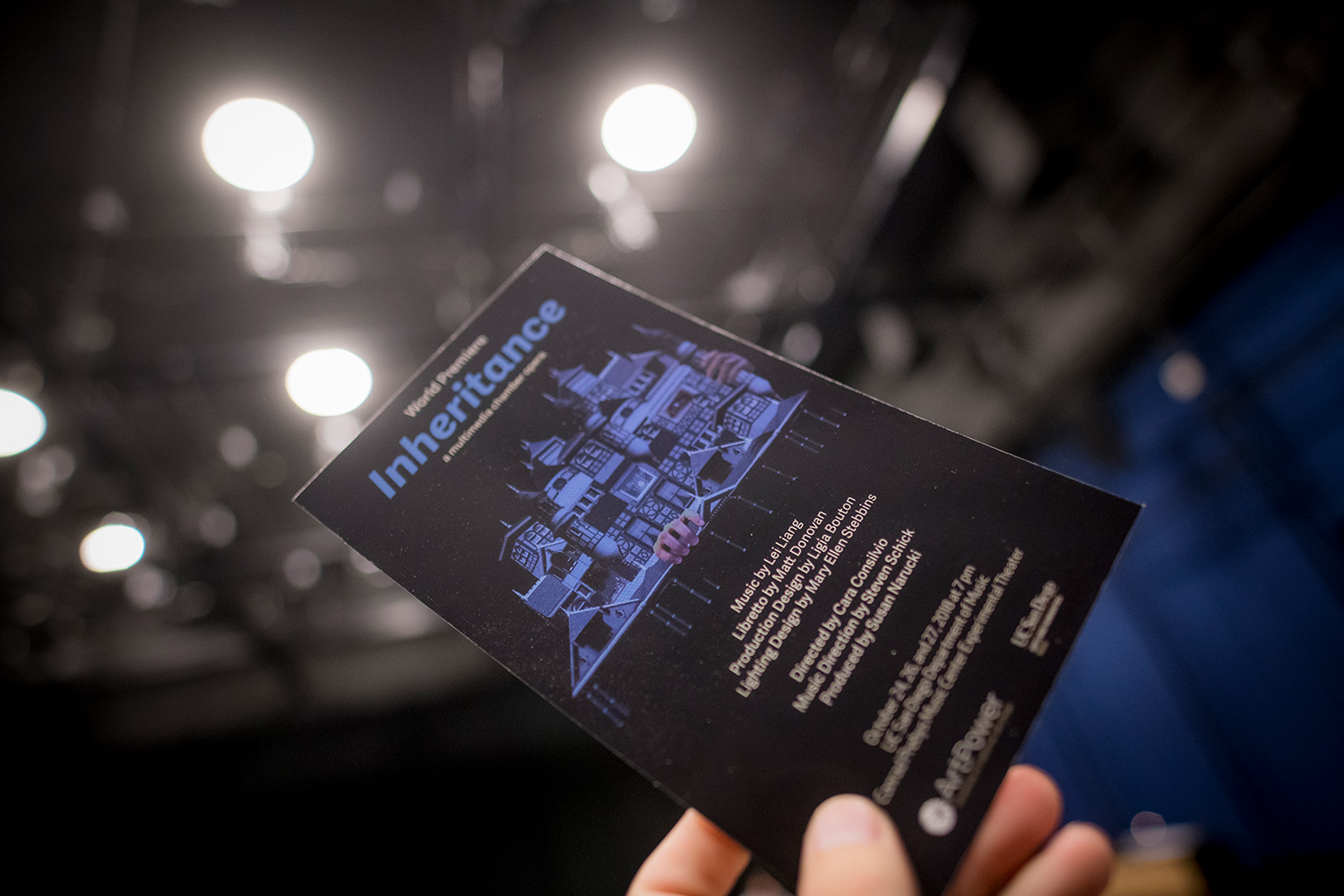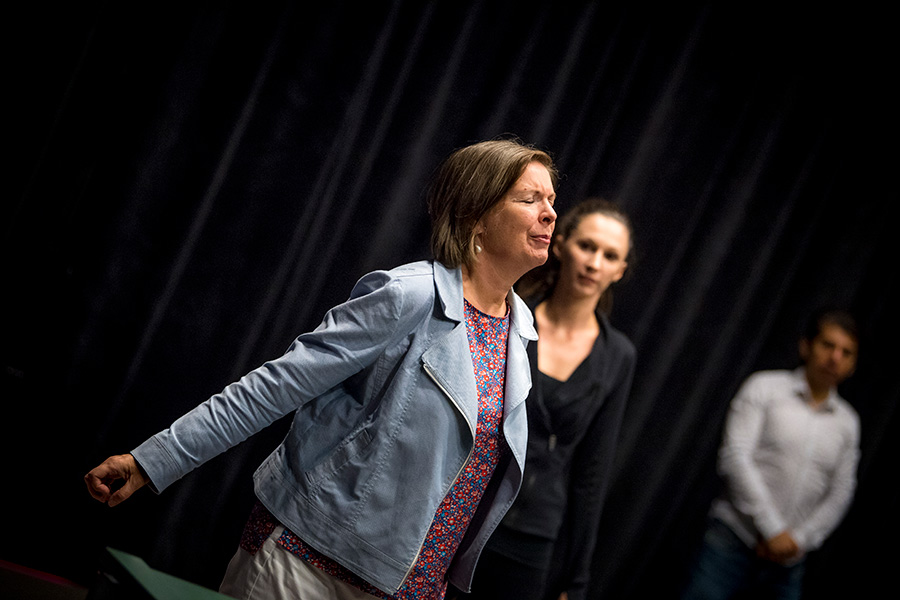What Exactly is Chamber Opera, Anyway?
Department of Music’s Susan Narucki and Lei Liang break down the genre and the production of ‘Inheritance’ ahead of its world premiere
Published Date
By:
- Anthony King
Share This:
Article Content

“Inheritance” will have three performances at the UC San Diego Conrad Prebys Music Center: Oct. 24, 26 and 27. (Photo by Erik Jepsen/ UC San Diego Publications)
For some, large-scale operas happen “over there:” massive, intimidating and somewhat inaccessible to the average audience member. But chamber opera is a completely new experience — that is, if you don’t count the 500 years that have passed since its inception.
“Chamber opera was actually the first form of opera,” said Susan Narucki, the UC San Diego Department of Music soprano producing “Inheritance,” receiving its world premiere Oct. 24. “What we’re doing, in fact, isn’t really new. We’re returning to the original format.”
Chamber opera is different than grand opera in that it has fewer singers, fewer instrumentalists and is usually done in smaller spaces, often with sets designed specifically to be easily portable from venue to venue. The overall duration of a chamber opera is usually shorter, too.
“Opera is a genre that has been constantly in a state of evolution, so we are at a very exciting time in the 21st century, where chamber opera and small-scale productions are becoming more important and more impactful,” Narucki said.
Narucki and fellow professor Lei Liang — composer for “Inheritance” and inaugural Research Composer in Residence at the Qualcomm Institute — came together in the UC San Diego studio in early September to talk about the genre. They said the art form itself was facing a renewal and, while the classical pieces of opera that they study and teach continues to resonate, they see this as a chance to move the genre forward.
“There are two things that I really love about the early operas,” Liang said, “one, that opera has evolved as the place to do experiments. There are a lot of new things you can try.
“The other thing I found that is really exciting is the route of chamber opera in that period is that it really came from a deep concern for humanity,” he said. “Why do we need these new techniques? It’s not just to invent some crazy sound, but it’s to express something. The operas truly are meaningful.”
“Inheritance” uses the legendary story of Sarah Winchester — the heir to the Winchester rifle fortune who was haunted by grief in the latter part of her life — to spark a conversation about gun violence in the United States. It’s a contemporary issue in a classic format.
“In the development of a piece that addresses our complicated relationship with guns, we were looking for some way to juxtapose the past with the present. We found an historical figure around whom the story coalesces, and things quickly fell into place,” Narucki said, who plays Sarah Winchester in the production.
The opera begins in Winchester’s mind, where the character has difficulty speaking. There’s a “labyrinth of sound,” Narucki said, that mirrors the maze of her famous home and represents the struggle to break free from what’s weighing on her own mind. As the opera progresses, it becomes deeply expressive at its core: as composer, Liang “teaches” Winchester how to speak, giving her the opportunity to speak her pain.

From left, Susan Narucki, Kirsten Ashley Wiest and Josué Cerón in rehearsal. Hillary Jean Young, not pictured, rounds out the vocal cast for “Inheritance.” (Photo by Erik Jepsen/ UC San Diego Publications)
“Her singing became lyrical because the music reveals the emotional side of her that I felt is best expressed through singing,” Liang said, dedicating his composition to Narucki. At the end of the opera, Winchester speaks directly to the audience: “We realize that we’re the ones who have been unable to articulate. She’s the one who has gained a voice,” he said.
The opera’s libretto, or text, is by poet Matt Donovan of Smith College. Production design, including costumes, set and extensive video footage, are created by artist Ligia Bouton of Mount Holyoke College. UC San Diego Distinguished Professor of Music and Reed Family Presidential Chair Steven Schick serves as music director for Liang’s original score, and Cara Consilvio serves as stage director, with lighting design by Mary Ellen Stebbins.
Donovan, who like Liang has young children of his own, was first to bring the story of Winchester to the group, and said he wanted to keep a sense of empathy for the character that translates to a “human truth” for everyone: the humanity Liang appreciated in chamber opera.
“There is such stasis right now with the gun situation in our country. There is such a polarization,” Donovan said at the Banff Center for the Arts, when the creative team met to dive into the production. “So the hope is that this opera can be a way of putting the issue in front of people again, getting us to ask questions, hopefully even a call to action — a beginning that might break the paralysis that we are in.”
Audiences for “Inheritance” are truly in for a special experience, Narucki and Liang said. The Experimental Theatre is an intimate, 170-seat, black-box style space that provides an up-close-and-personal experience for everyone in attendance. Joining four vocalists on stage are a handful of musicians, interacting with the set and visuals that include projected images of the Winchester mansion, curtains and even words from the libretto itself.
Commissioned and produced by Narucki, and co-presented by the Department of Music and ArtPower at UC San Diego, “Inheritance” runs for three performances only: Oct. 24, 26 and 27 at 7 p.m. in the UC San Diego Conrad Prebys Music Center Experimental Theater. Individual, general admission seats are $25; $14 for youth age 5-17. Tickets and parking information are available via ArtPower.
Share This:
You May Also Like
Stay in the Know
Keep up with all the latest from UC San Diego. Subscribe to the newsletter today.



